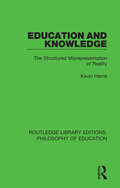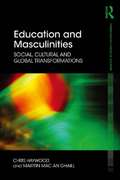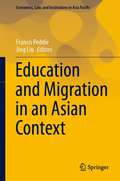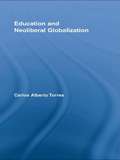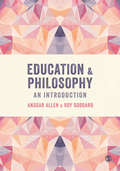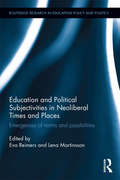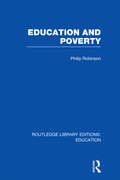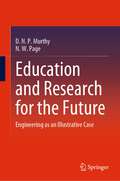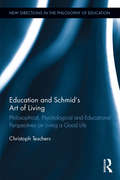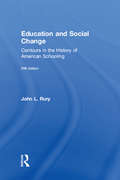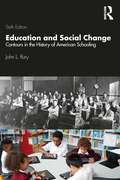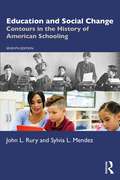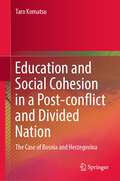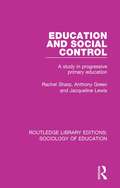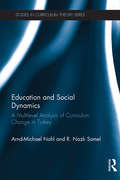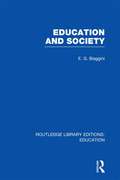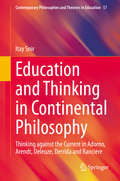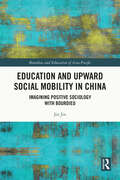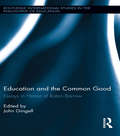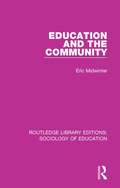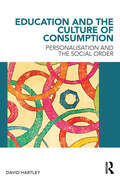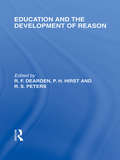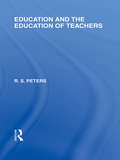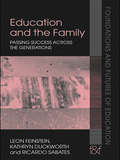- Table View
- List View
Education and Knowledge: The Structured Misrepresentation of Reality (Routledge Library Editions: Philosophy of Education #9)
by Kevin HarrisIn this book, first published in 1979, Kevin Harris explores the idea that in capitalist liberal democracies formal education functions essentially not to reveal reality, but rather to transmit to each new generation a structured misrepresentation of reality. In defence of this controversial and thought-provoking view, the author argues that all knowledge of the world is theory-laden and that a neutral, detached, objective description of the world is impossible. This title will be of interest to students of the philosophy of education.
Education and Masculinities: Social, cultural and global transformations (Foundations and Futures of Education)
by Chris Haywood Mairtin Mac an GhaillAcross media, academy and popular culture in western societies there is much talk of an implosion of the modern gender order. Education is often presented as a key site in which a crisis of masculinity is played out, and schools have become a focus for practical attempts to reconcile social and cultural transformations through the recalibration of teaching and learning, increasing male teachers and masculinising the content of subjects. Education and Masculinities argues that we are experiencing a shift from the establishment of the social constitution of gender associated with modernity politics, to the gendering of society that has an intensified resonance among men and women in a global-based late modernity. The book explores the main social and cultural approaches to education and masculinities within the broader context of sex and gender relations, considering the masculinity question alongside local and global changes in society, and bringing a fresh evaluation of key issues. Included in the book: -how the suggestion of ‘academically successful girls’ and ‘failing boys’ plays out in relation to issues of inequality across class and ethnicity -a current empirical analyses of gender inequality across schools, higher education and the labour market -representation, identity and cultural difference with reference to male and female social experiences and cultural meanings -forms of power connected to social divisions and cultural differences. Education and Masculinities provides a critical yet constructive diagnosis of gender relations across educational sites, exploring both academic accounts and alternative global responses that illustrate the limits of Western models and sensibilities.This accessible book will be valuable reading for students following courses in education, sociology, gender studies, and other social sciences and humanities courses.
Education and Migration in an Asian Context (Economics, Law, and Institutions in Asia Pacific)
by Jing Liu Francis PeddieThis edited book explores the complex and multifaceted connections between education and migration in an Asian context from multiple perspectives. It features studies from China, Japan, India, the Philippines, Thailand, and Timor-Leste and covers diverse migration and education experiences. These experiences encompass internal and international migration and forced displacement, as well as questions surrounding education such as school choice, education provision and training as human capital; education and social inclusion; and student performance in a post-conflict context. By covering a wide range of questions and situations, the original scholarship in this book reveals how human development concerns and higher rates of movement within and outside of Asian countries operate on multiple levels in a globalized world.
Education and Neoliberal Globalization (Routledge Research in Education #Vol. 18)
by Carlos Alberto TorresThis volume by noted critical education scholar Carlos Alberto Torres takes up the question of how structural changes in schooling and the growing impacts of neoliberalism and globalization affect social change, national development, and democratic educational systems throughout the world. The first section of the book offers analytical avenues to understand and criticize the practices and policies of neoliberal states, both domestically and internationally. More than a mere lament of the state of educational policy, however, Torres also documents the critiques and alternatives developed by social movements against neoliberal governments and policies. Ultimately, his work urges readers to engage in the struggle to resist the oppressive forces of neoliberal globalization, and proactively and deliberately act in informed ways to create a better world.
Education and Philosophy: An Introduction
by Ansgar Allen Roy GoddardPhilosophy is vital to the study of education, and a sound knowledge of different philosophical perspectives leads to a deeper engagement with the choices and commitments you make within your educational practice. This introductory text provides a core understanding of key moments in the history of Western philosophy. By introducing key transition points in that history, it investigates the plight of present day education, a period in which the aims and purposes of education have become increasingly unclear, leaving education open to the rise of instrumentalism and the forces of capital. Accessibly written, the book carefully analyses the common assumptions and conflicted history of education, provoking questioning about its nature and purposes. The authors argue vigorously that thinking critically about education from a philosophical perspective will give practicing and trainee teachers, as well as students on undergraduate Education and Masters-level courses a fuller command of their own role and context.
Education and Philosophy: An Introduction
by Ansgar Allen Roy GoddardPhilosophy is vital to the study of education, and a sound knowledge of different philosophical perspectives leads to a deeper engagement with the choices and commitments you make within your educational practice. This introductory text provides a core understanding of key moments in the history of Western philosophy. By introducing key transition points in that history, it investigates the plight of present day education, a period in which the aims and purposes of education have become increasingly unclear, leaving education open to the rise of instrumentalism and the forces of capital. Accessibly written, the book carefully analyses the common assumptions and conflicted history of education, provoking questioning about its nature and purposes. The authors argue vigorously that thinking critically about education from a philosophical perspective will give practicing and trainee teachers, as well as students on undergraduate Education and Masters-level courses a fuller command of their own role and context.
Education and Political Subjectivities in Neoliberal Times and Places: Emergences of norms and possibilities (Routledge Research in Education Policy and Politics)
by Lena Martinsson Eva ReimersEducation and Political Subjectivities in Neoliberal Times and Places investigates the conditions and possibilities for political subjectivities to emerge in international educational contexts, where neoliberal norms are repeated, performed and transformed. Through demonstrating the possibility of political subjectivities, this book argues that neoliberalism should neither be considered post-political, nor a natural law by which educational practices have to abide. This book considers how political subjectivities are made possible in education in spite of dominant neoliberal norms. Chapters address key theoretical discussions surrounding these different, sometimes contradicting, norms and their relationship to education, economy and politics. This innovative approach considers diverse educational and political initiatives in the wake of new public management, postcolonial perspectives on neoliberal education, and educational practices and critical possibilities. The book advocates understanding and enacting democracy as an experiment, based on the conception that democracy is constantly constructed and constitutes a transformative process in society in general as well as in education. This book advances the argument that there is still room for political subjectivity in spite of the dominance of neoliberal educational governance. It will appeal to researchers, academics and postgraduate students in the fields of higher education, education policy and politics, sociology of education and comparative and international education, as well as those interested in neoliberalism, new public management, and inequality.
Education and Poverty (Routledge Library Editions: Education)
by Philip RobinsonThis book describes the attempts that have been made to achieve an educational policy relevant to those most disadvantaged in our society; examines the different ways in which sociologists have conceptualized the related problems; and evaluates the success of the policy. He suggests that we are in need both of a more realistically defined view of what schools can do and a concerted official approach to compensatory policy.
Education and Research for the Future: Engineering as an Illustrative Case
by D. N. Murthy N. W. PageThis book takes a fresh look at the fundamental character of education, its history, interaction with society, purpose, changing focus over time and interactions with technology. It surveys the role of research in increasing the body of knowledge leading to new technologies that have helped serve the needs of humankind.In our lifetime there have been profound changes to the world we live in; the technologies used, the problems we struggle with, and the education systems intended to prepare this and following generations for the future. Many of the problems we face now are more complex than in earlier times, requiring broadly based approaches our traditional silo specialisations are ill-prepared to deal with. They involve technologies whose range of positive and negative effects are not well understood. Many of these problems are global in nature and can no longer be treated just as local issues. Our current approach to education does not adequately prepare us to tackle these problems.New approaches to education are needed to prepare us for the changes that are to come. The future of our planet, our civilisation, our community and our economy depend on it. This book proposes changes that will better prepare us for this future.
Education and Schmid's Art of Living: Philosophical, Psychological and Educational Perspectives on Living a Good Life (New Directions in the Philosophy of Education)
by Christoph TeschersInstead of simply following the current neoliberal mantra of proclaiming economic growth as the single most important factor for maintaining well-being, Education and Schmid’s Art of Living revisits the idea of an education focused on personal development and the well-being of human beings. Drawing on philosophical ideas concerning the good life and recent research in positive psychology, Teschers argues in favour of shifting the focus in education and schooling towards a beautiful life and an art of living for today's students. Containing a thorough discussion of the ideas of contemporary German philosopher Wilhelm Schmid, this book considers the possible implications of developing a more humanistic and life-centred approach to educational policy, research and practice, showing that Schmid’s concept of Lebenskunst provides a firm philosophical basis for this endeavour. Among others, this book draws on analytical and continental traditions to challenge current views and assumptions in regard to education and the role of schooling for contemporary societies. As a result, Teschers’ work is sure to spark a debate about the direction of educational policy and practice in the 21st century. Education and Schmid’s Art of Living is essential reading for academics and students with an interest in education. Given the importance of such topics as the relationship between education and society, teacher education and how best to structure schools and learning environments, Teschers’ work will appeal to academics and students in a diverse range of fields, including education, philosophy, sociology and psychology.
Education and Social Change
by John L. RuryThis brief, interpretive history of American schooling focuses on the evolving relationship between education and social change. Like its predecessors, this new edition investigates the impact of social forces such as industrialization, urbanization, immigration and cultural conflict on the development of schools and other educational institutions. It also examines the various ways that schools have contributed to social change, particularly in enhancing the status and accomplishments of certain social groups and not others. Detailed accounts of the experiences of women and minority groups in American history consider how their lives have been affected by education. Changes in this new edition include the following: A more thorough treatment of key concepts such as globalization, human capital, social capital, and cultural capital. Enhanced attention to issues of diversity throughout. Greater thematic coherence as a result of dividing chapter 6 into two chapters, the first focusing on the postwar period and emphasizing the themes of equity and social justice and the second focusing on human capital in education, highlighting the standards movement, federal policy changes and neo-liberal reform. A revision of several focal point discussions for greater clarity and thematic releance. Update discussions of recent changes in educational politics, finance and policy, especially the troubles presently facing No Child Left Behind (NCLB).
Education and Social Change: Contours in the History of American Schooling
by John L. RuryThis brief, interpretive history of American schooling focuses on the evolving relationship between education and social change. Like its predecessors, this new edition investigates the impact of social forces such as industrialization, urbanization, immigration, and cultural conflict on the development of schools and other educational institutions. It also examines the various ways that schools have contributed to social change, particularly in enhancing the status and accomplishments of certain social groups and not others. Detailed accounts of the experiences of women and minority groups in American history consider how their lives have been affected by education at key points in the past. Updates to this edition A revised final chapter updated to include recent changes in educational politics, finance, policy, and a shifting federal policy context Enhanced coverage and new conceptual frames for understanding the experiences of women and people of color in the midst of social change Edited throughout to update information and sources regarding the history of American education and related processes of social transformation in the nation’s past
Education and Social Change: Contours in the History of American Schooling
by John L. Rury Sylvia L. MendezThis concise, interpretive history of American schooling focuses on the evolving relationship between education and social change.Like its predecessors, this fully updated new edition investigates the impact of social forces such as industrialization, urbanization, immigration, globalization, and cultural conflict on the development of schools and other educational institutions. It also examines the various ways that schools have contributed to social change, particularly in enhancing the status and accomplishments of certain social groups and not others. Detailed accounts of the experiences of women and minority groups in American history consider how their lives have been affected by education at key points in the past.Updates to the seventh edition include: Enhanced coverage for understanding the experiences of Native Americans, students in poverty settings, and the LGBTQ+ community in the midst of social change. New topics include settler colonialism, indigeneity, culturally diverse education, gay and transgender educational policies, charter schools, voucher programs, and the rise of testing in schools. It has been edited throughout to update information and sources regarding the history of American education and related processes of social transformation in the nation’s past.This bestselling introductory text is essential reading for Educational Foundations, History of Education, and Schools and Society, and similar courses for pre-service teachers, educational leaders, and others.New online material includes discussion questions and links to further reading and resources, available at www.routledge.com/9781032745947
Education and Social Cohesion in a Post-conflict and Divided Nation: The Case of Bosnia and Herzegovina
by Taro KomatsuThis book discusses education’s role of developing social cohesion in a post-conflict environment where tensions continue to exist between the three “constituent” ethnic groups. It offers fresh insights into the relationship between education and social cohesion in a specific context of Bosnia & Herzegovina, where the need to rebuild social trust is acutely felt. This book first elaborates the concept of social cohesion and illustrates possible mechanisms through which education can develop, or further erode, social cohesion in already divided societies. Then, it carefully examines such mechanisms, using a case study of a Bosnia & Herzegovina which witnessed violent conflict instigated by ethno-identity politics during 1992-1995, and has been struggling to reconstruct its broken social fabric since then.
Education and Social Control: A Study in Progressive Primary Education (Routledge Library Editions: Sociology of Education #49)
by Anthony Green Rachel Sharp Jacqueline LewisFirst published in 1975, this book offers a critique of some of the ‘new perspectives’ in the sociology of education. This is achieved through a case study of a progressive child centred school. The book suggests that a liberal approach to education fails to appreciate how thoroughly a complex, stratified industrial society penetrates the school. It argues that the practice of ‘progressive’ education may be a modern form of conservativism and an effective form of social control both in the narrow sense of achieving classroom discipline and in the wider sense of contributing to the promotion of a static social order. It cautions against naïve utopian solutions which see the freedom and self-development of the child as an individualized process, unrelated to a social context which may undermine the ideals of freedom and spontaneous self-development. In addition to offering a study of the implementation of the ‘open’ approach to child development and pedagogy, the book can also be read as a piece of critical sociology, intended to make the reader look again at the way in which problems have been generated and solutions proposed within sociology and education.
Education and Social Dynamics: A Multilevel Analysis of Curriculum Change in Turkey (Studies in Curriculum Theory Series)
by Arnd-Michael Nohl R. Nazlı SomelEducation and Social Dynamics offers a new approach to analyzing curriculum change by investigating the entanglement of education and society in markedly heterogeneous Turkey, which has recently witnessed nation-wide curriculum reforms. While the new curriculum has attempted to homogenize all Turkish primary schools since 2005, Nohl and Somel, drawing on a theoretical differentiation of social entities, reveal how subsequent curricular practices have had to account for the diversity of milieus and organizations in the nation’s educational sector, and how inequality and competition run rampant in the standardization efforts. Using expert interviews, group discussions, and other empirical data that compare instructional practices within five distinct schools, the book represents a breakthrough in our understanding of developments in Turkey and their significance for extant theories of curriculum development and reform worldwide. By linking specific case study material from Turkey to intensifying international concerns, it provides an important and relevant global commentary.
Education and Society (Routledge Library Editions: Education #166)
by E. G. BiagginiThis volume discusses how the lay-person responds to written appeals to his intelligence and feelings with particular emphasis on education and culture. The author indicates a possible approach to the task of investigation rather than all that can be done with the method employed. The second part deals with educational questions relevant to the evidence and examines the social implications of this evidence.
Education and Thinking in Continental Philosophy: Thinking against the Current in Adorno, Arendt, Deleuze, Derrida and Rancière (Contemporary Philosophies and Theories in Education #17)
by Itay SnirThis book draws on five philosophers from the continental tradition – Theodor Adorno, Hannah Arendt, Gilles Deleuze, Jacques Derrida, and Jacques Rancière – in order to “think about thinking” and offer new and surprising answers to the question: How can we educate students to think creatively and critically? Despite their differences, all of these philosophers challenge the modern understanding of thinking, and offer original, radical perspectives on it. In very different ways, each rejects the modern approach to thinking, as well as the reduction of proper thought to rationality, situating thinking in sociohistorical reality and relating it to political action. Thinking, they argue, is not a natural, automatic activity, and the need to think has become all the more important as political reality seems to exhibit less thinking, or to even celebrate thoughtlessness. Bringing these continental conceptions of thinking to bear on the urgent need to educate young people to think against the current, this book makes a significant contribution to educational theory and political philosophy, one that is particularly relevant in today’s anti-intellectual climate.
Education and Upward Social Mobility in China: Imagining Positive Sociology with Bourdieu (Bourdieu and Education of Asia Pacific)
by Jin JinBased on a three-year life story study of students from working-class backgrounds at four elite universities in China, this book offers a new way to understand and be inspired by Bourdieu.This book shows how Bourdieu’s ideas can be used to go beyond the analysis of domination and imagine a positive sociology of emancipation. Drawing on life stories of high-achieving students from working-class backgrounds, who experienced extreme social mobility in the education system and beyond, this book tracks multi-scalar and multi-layered class domination while documenting vivid experiences of living with and over structural disadvantages, forms of working-class ‘intelligence’, reflexive strategies, ‘failures’ of social reproduction, and moments of ‘mutations’. Through constant comparisons between life stories and Bourdieu, hopes and costs of upward social mobility, and possibilities and boundaries of transcendence, this book reflects on different conceptualisations of working-class reflexivity and suggests a vision of emancipation that can allow and encourage ways and values of ‘commoning’. This book highlights a relational perspective of understanding class and class struggles, which in turn introduces a relational perspective of (re)imagining reflexivity and transcendence.This book will appeal to students and scholars of Bourdieu, sociology of education, and education in China.
Education and the Common Good: Essays in Honor of Robin Barrow (Routledge International Studies in the Philosophy of Education #31)
by John GingellRobin Barrow has been one of the leading philosophers of education for more than forty years. This book is a critical but appreciative examination of his work by some of the leading philosophers of education at work today, with responses from Professor Barrow. It will focus on his work on curriculum, the analytic tradition in philosophy, education and schooling, and his use of Greek philosophy to enrich current debates in the subject. This work will be of interest to all those who have been influenced by his contributions to educational and philosophical debate.
Education and the Community (Routledge Library Editions: Sociology of Education #37)
by Eric MidwinterFirst published in 1975, this book is the first to set out a blueprint for how schools can move from a ‘traditional’ to a ‘community’ base at local authority level. After presenting a historical analysis of the organisational development of the local education authority, it goes on to put forward a detailed proposal for an across-the-board, radically reformed education service at pre-school, school, post-school and college levels. Finally, it locates such a reformed ‘community education’ system in the context of community development at large.
Education and the Culture of Consumption: Personalisation and the Social Order
by David HartleyFor nearly 200 years the organisational form of the school has changed little. Bureaucracy has been its enduring form. The school has prepared the worker for the factory of mass production. It has created the 'mass consumer' to be content with accepting what is on offer, not what is wanted. However, a ‘revised’ educational code appears to be emerging. This code centres upon the concept of ‘personalisation’, which operates at two levels: first, as a new mode of public service delivery; and second, as a new ‘grammar’ for the school, with new flexibilities of structure and pedagogical process. Personalisation has its intellectual roots in marketing theory, not in educational theory and is the facilitator of 'education for consumption'. It allows for the 'market' to suffuse even more the fabric of education, albeit under the democratic-sounding call of freedom of choice. Education and the Culture of Consumption raises many questions about personalisation which policy-makers seem prone to avoid: Why, now, are we concerned about personalisation? What are its theoretical foundations? What are its pedagogical, curricular and organisational consequences? What are the consequences for social justification of personalisation? Does personalisation diminish the socialising function of the school, or does it simply mean that the only thing we share is that we have the right to personalised service? All this leads the author to consider an important question for education: does personalisation mark a new regulatory code for education, one which corresponds with both the new work-order of production and with the makeover-prone tendencies of consumers? The book will be of great interest to postgraduate students and academics studying in the fields of education policy and the social foundations of education, and will also be relevant to students studying public policy, especially health care and social care, and public management.
Education and the Development of Reason (International Library of the Philosophy of Education Volume 8)
by R. F. DeardenThis volume critically and constructively discusses philosophical questions which have particular bearing on the formulation of educational aims. The book is divided into three major parts: the first deals with the nature of education, and discusses the various general aims, such as 'mental health', 'socialization' and 'creativity' which have been thought to characterize it; the second section is concerned with the nature of reason and its relationship to feeling, will and action; finally the development of different aspects of reason in an educational context is considered.
Education and the Education of Teachers (International Library of the Philosophy of Education volume 18)
by R.S. PetersThis collection of important and significant papers examines a wide range of issues. One of the author's main concerns is to clarify the meaning of 'education' and 'quality in education' - a phrase often used in public debate but seldom scrutinized. Long-standing ambiguities latent in the concept of 'liberal education' are also exposed, and Herbert Spencer's question 'What knowledge is of most worth?', vital in the light of the recent vast development of knowledge, is considered. The first section of the collection clarifies different aspects of the concept of education and to reflect upon the difficulties and dilemmas facing teachers who strive to educate their pupils as distinct from just preparing them for examinations. This section concludes with a constructive re-examination of Plato's conception of education with a view to seeing what is acceptable in it instead of just concentrating on what is manifestly unacceptable. The second section is concerned with the role of edcuational theory in the education of teachers.
Education and the Family: Passing Success Across the Generations (Foundations and Futures of Education)
by Leon Feinstein Kathryn Duckworth Ricardo SabatesWhy it is that success, deprivation or disadvantage are so often passed down intergenerationally? What part does education play? The educational achievement of parents is often reflected in that of their children and there are many underlying causes for such a relationship. Education and the Family argues that government policy has an important role to play in addressing this inequality even though many of the causes lie within the home. Although each child should be supported to achieve his or her objectives, differences in the willingness or capabilities of families to take advantage of educational opportunities exacerbate social class differences and limit actual equality of opportunity for many. Understanding the causes of this transmission is key to tackling both social class inequality and to expanding the skill base of the economy. By providing an overview of academic and policy thinking in relation to the role of the family, this book explores the educational success of children. It focuses on the education of the parents but also considers how the family - compared to wider, external influences such as schools - is a driver of differences in educational outcomes. It concludes with a consideration of what policy-makers are attempting to do about this key issue and why, and how this will impact on schools and teachers. This book will interest researchers and academics in education and social policy, as well as teachers and other education and social policy practitioners.
